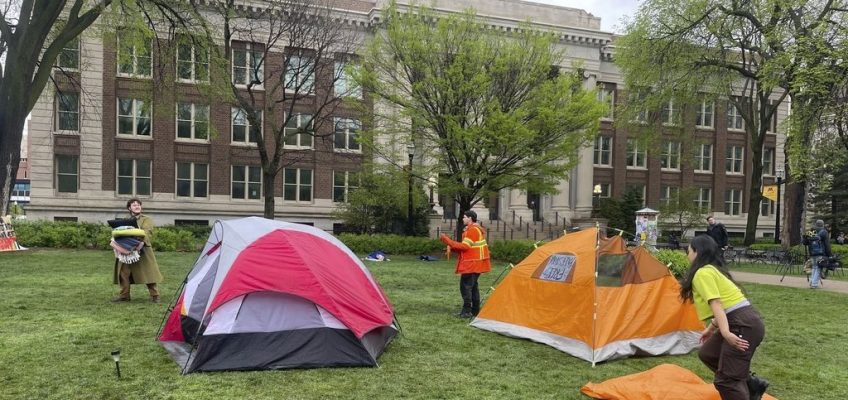April 17 was a dark day for academic freedom in the United States. Columbia University President Nemat Shafik told a congressional hearing that some statements heard during recent protests — such as “from the river to the sea” — might be punished by the school. She also named several professors who were under investigation for allegedly antisemitic comments.
College faculty around the country were quick to condemn the hearing, which conjured the worst images of the Joseph McCarthy era: snoopy conservative lawmakers questioning scared university officials about who said what to whom and why. According to Irene Mulvey, national president of the American Association of University Professors, Shafik “threw academic freedom and Columbia University faculty under the bus.”
That’s true, and it’s frightening. But the professors under fire at Columbia have criticized Israel, echoing the dominant view on campus. It’s a lot harder to defend the faculty members who dissent from the received wisdom. And if we throw them under the bus, too, academic freedom will die.
Consider Carole Hooven, the Harvard University biologist who was pushed out of her teaching position after she told a Fox News television show in 2021 that sex was binary. Hooven took pains to emphasize that gender could take any number of forms, and that everyone — of every gender — deserved respect. But sex, she said, was different: male or female.
Within a few short days, the outrage machine kicked into high gear. The director of a diversity and inclusion task force in Hooven’s department tweeted that her remarks about sex were “transphobic and hateful.” Graduate students refused to serve as teaching assistants for her popular lecture course about hormones and behavior, which was canceled. So was Hooven.
She walked around campus with her head down, lest someone recognize her as “the ‘transphobe’ from whom students needed to be protected,” she wrote.
And nobody with any administrative authority at Harvard spoke out in her defense. Not the chair of her department. Not the head of the local AAUP chapter. And not Claudine Gay, who was the dean of Harvard’s Faculty of Arts and Sciences at the time and later became president of the university.
The issue came up during Gay’s own fateful congressional testimony in December, before she lost her job as well. “In what world is a call for violence against Jews protected speech, but a belief that sex is biological and binary isn’t?” Rep. Tim Walberg from Michigan asked her.
In reply, Gay said that Harvard supports “constructive dialogue, even on the most complex and divisive issues.” But the biology of sex is a complex and divisive issue, and Gay did not protect Hooven’s right to dialogue about it. Nor did most Harvard faculty members, who sat on their hands while Hooven got pilloried.
Nobody questioned the scholarly chops of Hooven, who published a much-admired book on the science of testosterone. Instead, they said she had made trans people feel unwelcome and unsafe. She had to go.
If Hooven had denounced Israel as a colonialist and apartheid state — like several of the targeted Columbia professors did — would faculty members have stood by while she got pushed out, on the grounds that she made Jewish students feel unsafe? Of course not. Instead, we would have risen up to defend her academic freedom.
That’s what Columbia historian Christopher Brown did recently in a powerful campus speech that went viral. When Shafik told the congressional hearing that she would investigate the anti-Israel professors, Brown argued, she sacrificed academic independence to the whims of politics.
“There were members of Congress who wanted to decide who should be disciplined on this institution and how much, what should be taught, how it should be taught, who should teach, what academic department should exist and which should not, who should lose their leadership positions, who should be promoted, who should be fired,” Brown warned. “Those are academic questions; those are not congressional questions.”
Brown also condemned Shafik for calling in the police at Columbia, where they arrested more than 100 protesters.
But after the semester ends and the protests wane, the question of academic freedom will remain. And we can’t protect it from prying politicians if we’re playing politics with it ourselves.
Jonathan Zimmerman teaches history and education at the University of Pennsylvania. He is the author of “Whose America? Culture Wars in the Public Schools,” which was published in a 20th-anniversary edition by University of Chicago Press. He wrote this column for the Chicago Tribune.
Related Articles
Anthony Vaccaro: Does social media rewire kids’ brains? Here’s what the science really says
Isaacs, Rosenbaum: America’s ‘big glass’ dominance hangs on the fate of two powerful new telescopes
Tyler Cowen: Trump’s plans for the Fed make no sense, even for him
Jill Gurvey: Post-Oct. 7, I’m finally questioning the narrative about Jewish inheritance
Bret Stephens: Sheryl Sandberg screams back at the silence


Leave a Reply